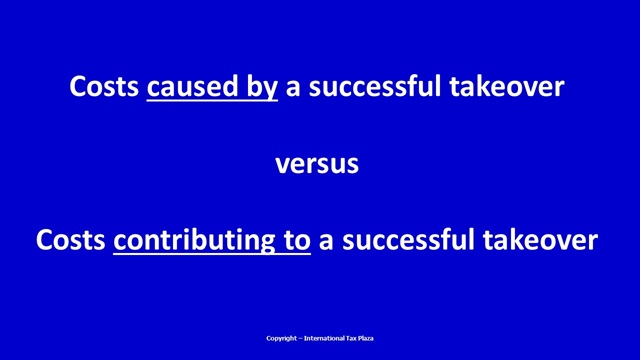On December 22, 2023 the Dutch Supreme Court passed judgment in a very interesting case (ECLI:NL:HR:2023:1793). In the underlying case the Dutch Supreme Court answers the question when costs qualify as non-deductible costs incurred regarding the acquisition or alienation of a participation as referred to in Article 13, Paragraph 1 of the Dutch corporate income tax (DCIT) Act. In our view this judgment is a must read for every tax expert that is involved in structures that involve a Dutch holding entity. In its judgment the Dutch Supreme Court ruled that in the underlying case the farewell bonuses that were paid to employees of participations that were sold by the taxpayer do not qualify as non-deductible costs that were incurred regarding the alienation of a participation as referred to in Article 13, paragraph 1 of the Corporate Tax Act 1969.
Facts
2.1 The taxpayer, a Dutch resident limited liability company (BV), held all shares in three qualifying participations. Two of these subsidiaries are residing abroad. The other subsidiary, a limited liability company (BV), is a resident of the Netherlands (hereinafter: the participation). On April 9, 2015 the taxpayer sold the shares in the three subsidiaries to a third party.
2.2 After the sale referred to above in 2.1, payments were made to the entire staff of the former subsidiaries. These payments, totaling to € 1,502,854, were made at the expense of the taxpayer. The amount of the farewell bonus granted to each of the employees depended on the length of employment and the salary and performance of that employee.
2.3 On June 11, 2015 the taxpayer contacted the Dutch tax authorities about manner in which the payments would be included in the payroll and how wage taxes and social security contributions would be withheld over the benefits referred to in 2.2. These benefits were subsequently included in the payroll of the parent company of the taxpayer and paid out to the employees of the three former subsidiaries via another group entity. In the underlying financial year (2015/2016), a total amount of € 1,371,534 was paid to the employees of the participation.
2.4 In its Dutch corporate tax return for the financial year 2015/2016 the taxpayer took the payments into account as deductible costs for Dutch corporate income tax purposes.
2.5 The Dutch tax inspector has qualified the farewell bonusses as costs incurred regarding the sale of the participations (the three subsidiaries). Pursuant to Article 13, paragraph 1, of the DCIT Act the tax inspector therefore denied the deduction.
Legal context
Article 13, Paragraph 1 of the DCIT Act reads as follows:
“When determining the taxable profit, the income stemming from a participation, as well as the costs incurred regarding the acquisition or alienation of that participation are not taken into account (participation exemption).”

From the considerations of the Court
The core of the Supreme Court's decision can be found in its considerations 4.3 and 4.4.
“4.3 As the Dutch Supreme Court ruled in its judgment of December 7, 2018, ECLI:NL:HR:2018:2264 (hereinafter: the judgment of December 7, 2018), pursuant to Article 13, Paragraph 1 of the Dutch corporate income tax Act “the income stemming from a participation, as well as the costs regarding the acquisition or alienation of that participation are disregarded” when determining the taxable profit. The wording of this provision, and in particular the phrase “incurred regarding” that occurs therein, makes it clear that the participation exemption only applies to a specific cost if a relation exists between that cost and the acquisition or alienation of a participation. In the absence of further textual or legal historical indications on how to answer the question what relation is required; the Dutch Supreme Court uses the criterion of a direct causal relation. Expenses must be regarded as costs incurred regarding the acquisition or alienation of a participation as referred to in Article 13, paragraph 1 of the DCIT Act if they are caused by the acquisition or disposal of the relevant participation, in the sense that without that acquisition or alienation the costs would not have been incurred. The presence of such relation must be assessed according to objective criteria.
4.4.1 The required direct causal relation that the costs must be caused by the alienation (as described above in 4.3) includes the condition that those costs have such a causal relation with the alienation that they are incurred because - assessed objectively – they are useful or necessary to achieve that alienation. To clarify this, the judgment of December 7, 2018 added that the costs would otherwise, so without that (intended) alienation, not have been incurred. The aforementioned direct causal relation is absent in the case of costs that although they would not have been incurred if the alienation had not taken place, but which cannot otherwise contribute in any way to the realization of that alienation. Such expenses do not have a direct causal relation to the alienation in the manner as referred to above in 4.3. These costs are not useful nor necessary to achieve that alienation.
4.4.2 In light of the foregoing, the expenditure of the taxpayer for the farewell bonuses cannot be regarded as costs incurred regarding the alienation of the participation, because the required direct causal link between the costs and the alienation is lacking: After all the District Court has established that the farewell bonuses were not paid with the intention of alienating the participation. From this it follows that these costs were not “caused” by the alienation in the sense as meant above. Even if they would not have been awarded and paid out without the alienation of the participation having taken place. The latter circumstance rather means that the awarding of the farewell bonuses is the result of the alienation, because the sales proceeds facilitated these payments. The District Court's finding that such expenses are considered to be non-deductible costs relating to the alienation of the participation therefore demonstrates an incorrect interpretation of law. Plea III is therefore successful.”
The full text of the judgment of the Dutch Supreme Court (in the Dutch language) can be found here.
Remarks ITP
In its ruling, the Supreme Court appears to have come to the, in our opinion justified, conclusion, that in order to fall within the scope of Article 13, Paragraph 1 of the DCIT Act, it is not enough that the costs are caused by the acquisition/alienation of a participation, but that the costs must be necessary to achieve a successful acquisition/alienation of a qualifying participation. But the judgment might also open the door to discussions between taxpayers and the Dutch tax authorities regarding the question which costs are contributing to coming to a successful realization of an acquisition or alienation.
Copyright – internationaltaxplaza.info
Follow International Tax Plaza on Twitter (@IntTaxPlaza)





